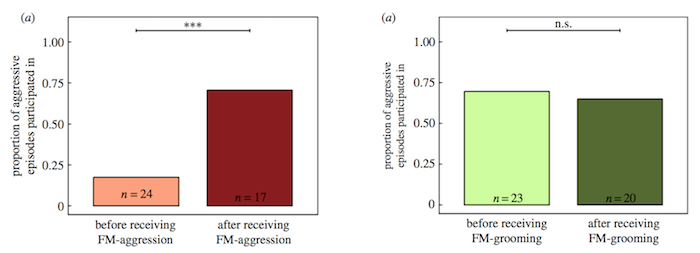Vervet monkeys can be testy. Squabbling between social groups is common, particularly when food is at stake. Females of the species, which tend to remain in the same location and social group, have a much greater incentive to guard and fight over food sources than males, which change social groups several times in their lives. Therefore, when intergroup territorial conflict arises, males don't always feel obliged to participate.
Woe be unto the males who make this grave mistake. New research in the Proceedings of the Royal Society B reveals that males who choose to sit out during such scuffles may be subjected later to domestic abuse.
The team observed the interactions of four groups of vervet monkeys in South Africa. Conflicts, which lasted anywhere from a few minutes up to 8 hours, consisted of monkeys from one group screaming at or chasing monkeys of another group. During ceasefires, females would interact with the males in their group. The ones who engaged in the previous fight were groomed, while the ones who sat on the sidelines were scolded, chased, and occasionally attacked.
This system of discipline works exactly as intended. When the next fight occurred, previously rebuked males were likelier to join the battle. (See figure.)

The left panel depicts how males that were subjected to punishment were much likelier to participate in subsequent intergroup fights, while the right panel shows how males that were groomed maintained a similar level of aggression. Two males that were frequent combatants were never once punished by the females.
Overall, females rarely dished out rewards and punishments. That, however, may come as little comfort to the males who prefer a more relaxed lifestyle.
Source: Arseneau-Robar TJM, Taucher AL, Muller E, van Schaik C, Bshary R, Willems EP. "Female monkeys use both the carrot and the stick to promote male participation in intergroup fights." Proc. R. Soc. B 283: 20161817. Published: 23-Nov-2016. http://dx.doi.org/10.1098/rspb.2016.1817

